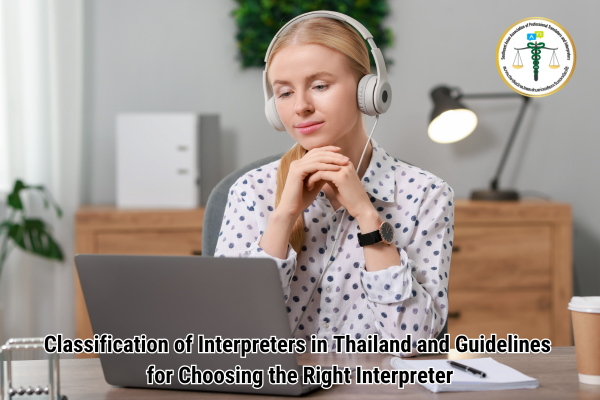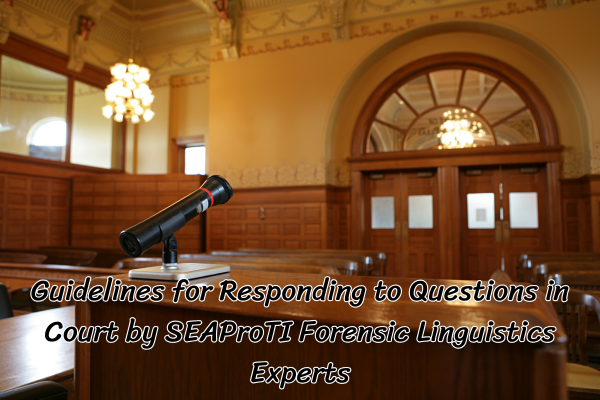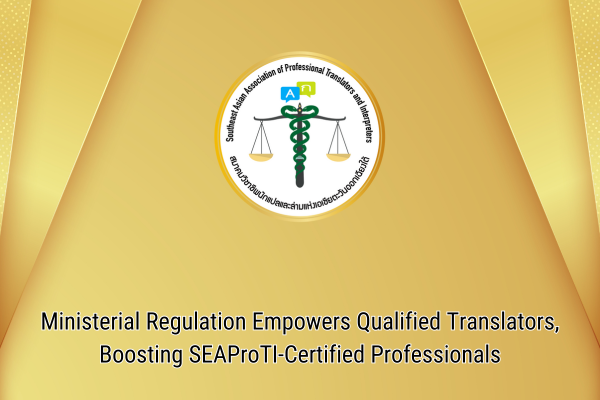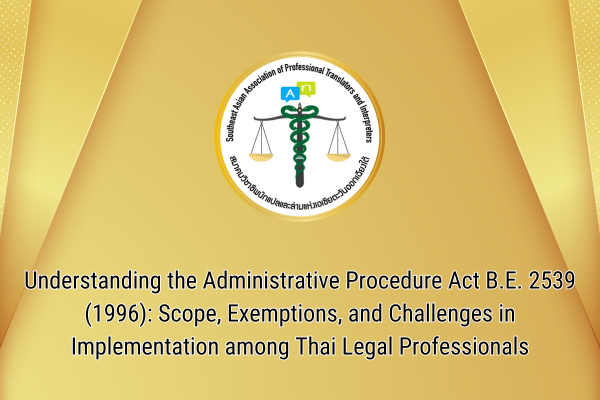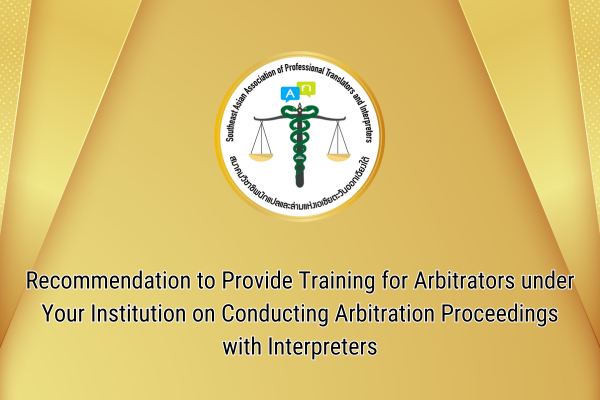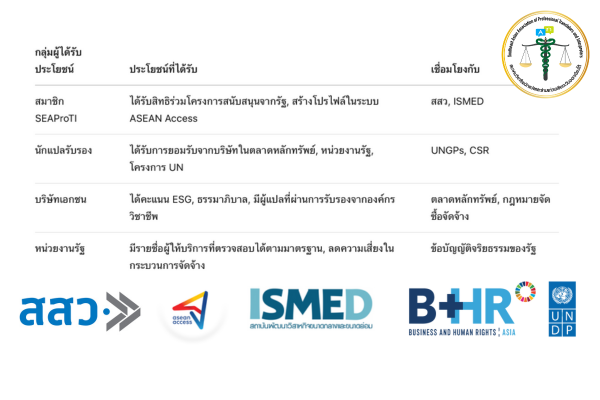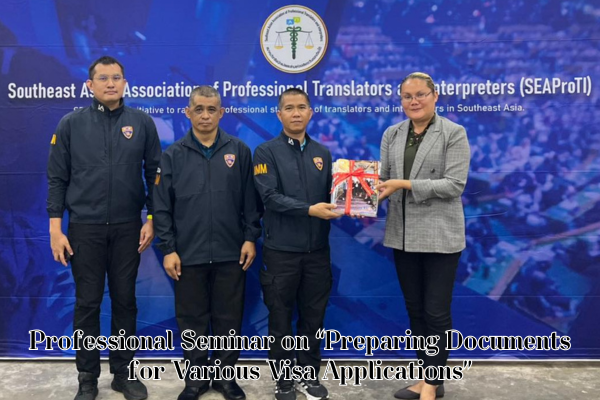Classification of Interpreters in Thailand and Guidelines for Choosing the Right Interpreter
4 February 2025, Bangkok – Interpreting is a crucial profession that facilitates communication between individuals who speak different languages. In Thailand, interpreters are essential in various sectors, including courts, hospitals, businesses, tourism, and government agencies. However, the system for categorizing interpreters in the country varies, with different standards and selection processes. This article will outline the types of interpreters in Thailand and provide guidelines for choosing the right interpreter for different purposes.
Types of Interpreters in Thailand
1. Certified Interpreters
This category of interpreters is certified by the Southeast Asian Association of Professional Translators and Interpreters (SEAProTI), the only official organization in Thailand that sets professional standards for interpreters. Certified interpreters must undergo rigorous training and examinations under the Peer Certification system, where they are evaluated by professionals of equivalent expertise. Additionally, these professionals are licensed to practice as certified translators, translation verifiers, and certified interpreters under the name of SEAProTI. Many of them also hold certifications from international organizations.
Certified interpreters from SEAProTI are qualified to work in high-standard environments, such as:
- Courtroom interpreters, who must adhere to legal ethics and standards.
- Police interpreters, who assist in interrogations and justice proceedings.
- Medical interpreters, who require specialized knowledge to prevent communication errors in healthcare settings.
- Conference interpreters, who facilitate international events and meetings.
2. Registered Interpreters
These interpreters typically have experience and are registered with government agencies. They may undergo minimal training or assessments to ensure they have basic competency, but they do not meet the rigorous certification standards of SEAProTI. They are often issued general certificates.
Registered interpreters are suitable for tasks that require general communication skills, such as:
- Non-complex judicial proceedings.
- Business coordination and product introductions at trade events and exhibitions.
3. Enlisted Interpreters
This category consists of interpreters who are listed by organizations that require a large number of personnel, such as government agencies or volunteer organizations. They do not undergo specific training or testing. While enlisted interpreters are easy to find, their quality and specialization are not guaranteed.
These interpreters are suitable for:
- Volunteer interpreters in charitable events.
- Basic communication tasks that do not require professional interpretation skills.
4. Freelance Interpreters
Freelance interpreters work independently without being affiliated with any organization. They may be certified or uncertified, depending on their qualifications and the organizations that recognize them. Some freelance interpreters hold certifications from both domestic and international institutions.
The advantage of freelance interpreters is their flexibility in choosing assignments. However, they must build their network and credibility to secure consistent work opportunities.
5. In-house Interpreters
These are full-time interpreters employed by private companies or government agencies. Their selection depends on the employer’s requirements, and they are not necessarily certified by professional associations. Instead, they are hired based on the employer’s discretion.
In-house interpreters are suitable for:
- Multinational corporations.
- Embassies and diplomatic missions.
- Government agencies.
Choosing the Right Interpreter
Selecting the right interpreter is crucial to ensuring effective communication. Consider the following factors:
- Legal Proceedings: For court cases and police interrogations, only SEAProTI-certified interpreters should be used due to their adherence to high standards and ethical guidelines.
- Medical Settings: Experienced interpreters with specialized knowledge should be chosen to prevent errors that could impact patient safety.
- International Conferences and Seminars: Professional conference interpreters should be hired, especially those trained in simultaneous interpretation, which requires advanced skills.
- General Communication Needs: Registered or enlisted interpreters may be used as needed, but their experience and qualifications should be verified beforehand.
Conclusion
In Thailand, interpreters are categorized into various groups, from SEAProTI-certified interpreters, who meet the highest professional standards, to registered, enlisted, freelance, and in-house interpreters. Choosing the right interpreter is essential, especially in legal, medical, and high-stakes scenarios. For legally binding and professional engagements, SEAProTI-certified interpreters are the most reliable choice.
Using the appropriate interpreter not only ensures smooth communication but also guarantees accuracy and credibility in conveyed information. Therefore, it is crucial to assess the interpreter’s qualifications and standards to achieve the best results in cross-linguistic communication.
SEAProTI’s certified translators, translation certification providers, and certified interpreters:
The Southeast Asian Association of Professional Translators and Interpreters (SEAProTI) has officially announced the criteria and qualifications for individuals to register as “Certified Translators,” “Translation Certification Providers,” and “Certified Interpreters” under the association’s regulations. These guidelines are detailed in Sections 9 and 10 of the Royal Thai Government Gazette, issued by the Secretariat of the Cabinet under the Office of the Prime Minister of the Kingdom of Thailand, dated July 25, 2024, Volume 141, Part 66 Ng, Page 100.
To read the full publication, visit: the Royal Thai Government Gazette
การจำแนกล่ามในประเทศไทยและแนวทางการเลือกใช้ล่ามให้เหมาะสม
ล่ามเป็นอาชีพที่มีบทบาทสำคัญในการสื่อสารระหว่างบุคคลที่ใช้ภาษาต่างกัน ในประเทศไทย ล่ามมีความจำเป็นในหลายภาคส่วน ไม่ว่าจะเป็นศาล โรงพยาบาล ธุรกิจ การท่องเที่ยว และหน่วยงานราชการ อย่างไรก็ตาม ระบบการรวบรวมล่ามในประเทศมีหลายรูปแบบ ซึ่งแต่ละรูปแบบมีมาตรฐานและกระบวนการคัดเลือกที่แตกต่างกัน บทความนี้จะอธิบายประเภทของล่ามในประเทศไทย และแนะนำแนวทางการเลือกใช้ล่ามให้เหมาะสมกับวัตถุประสงค์ของงาน
ประเภทของล่ามในประเทศไทย
1. ล่ามที่ได้รับการรับรอง (Certified Interpreters)
ล่ามประเภทนี้ได้รับการรับรองโดย สมาคมวิชาชีพนักแปลและล่ามแห่งเอเชียตะวันออกเฉียงใต้ (SEAProTI) ซึ่งเป็นองค์กรเดียวในประเทศไทยที่มีมาตรฐานรับรองล่ามอย่างเป็นทางการ ล่ามที่ได้รับการรับรองต้องผ่านกระบวนการอบรมและการสอบที่เข้มงวดโดยอิงระบบ Peer Certification หรือการประเมินโดยผู้เชี่ยวชาญที่มีคุณสมบัติเทียบเท่ากัน และเป็นผู้มีอำนาจและถือใบอนุญาตให้ประกอบวิชาชีพนักแปลรับรอง ผู้รับรองการแปล และล่ามรับรอง ในนามสมาคมวิชาชีพนักแปลและล่ามแห่งเอเชียตะวันออกเฉียงใต้ และบ่อยครั้งที่นักวิชาชีพเหล่านี้ก็ได้รับการรับรองจากหน่วยงานในต่างประเทศด้วย
ล่ามที่ได้รับการรับรองจาก SEAProTI สามารถทำงานในพื้นที่ที่ต้องการมาตรฐานสูง เช่น:
- ล่ามในห้องพิจารณาคดี (Courtroom Interpreters) ที่ต้องปฏิบัติตามหลักจรรยาบรรณและมาตรฐานทางกฎหมาย
- ล่ามตำรวจ (Police Interpreters) สำหรับสอบปากคำและกระบวนการยุติธรรม
- ล่ามทางการแพทย์ (Medical Interpreters) ที่ต้องมีความรู้เฉพาะด้านเพื่อป้องกันความผิดพลาดในการสื่อสาร
- ล่ามประชุม (Conference Interpreters) สำหรับงานระดับนานาชาติ
2. ล่ามที่ขึ้นทะเบียน (Registered Interpreters)
ล่ามกลุ่มนี้มักเป็นผู้ที่มีประสบการณ์และขึ้นทะเบียนไว้โดยหน่วยงานราชการ บางครั้งอาจมีการอบรมหรือทดสอบเล็กน้อยเพื่อให้แน่ใจว่ามีทักษะพื้นฐานเพียงพอ แต่ไม่มีมาตรฐานการสอบและการรับรองที่เข้มงวดเท่ากับล่ามของ SEAProTI และมีใบประกาศนียบัตรทั่วไป
ล่ามที่ขึ้นทะเบียนสามารถทำงานในสถานการณ์ที่ต้องใช้ทักษะการสื่อสารทั่วไป เช่น:
- ล่ามในกระบวนการยุติธรรมที่ไม่ซับซ้อน
- งานที่ไม่ต้องใช้ศัพท์เทคนิคหรือข้อกำหนดเฉพาะด้าน เช่น งานประสานงานภาษาต่างประเทศและนะนำสินค้าในงานอีเวนท์ งานแสดงสินค้า
3. ล่ามที่ขึ้นบัญชี (Enlisted Interpreters)
ล่ามกลุ่มนี้มักขึ้นบัญชีรายชื่อไว้ โดยองค์กรที่ต้องการบุคลากรจำนวนมาก เช่น หน่วยงานราชการ หรือองค์กรอาสาสมัคร โดยไม่มีการสอบหรืออบรมเฉพาะทาง จุดเด่นคือสามารถหาล่ามได้ง่าย แต่ไม่มีการประกันคุณภาพหรือลักษณะเฉพาะด้านที่ชัดเจน
ล่ามประเภทนี้อาจเหมาะกับงานที่ไม่ต้องการมาตรฐานสูง เช่น:
- ล่ามอาสาสมัครในกิจกรรมการกุศล
- งานที่เน้นความเข้าใจพื้นฐานของภาษาโดยไม่ต้องมีทักษะล่ามมืออาชีพ
4. ล่ามอิสระ (Freelance Interpreters)
ล่ามอิสระทำงานแบบไม่มีสังกัด สามารถรับงานได้ตามความต้องการของตลาด การเป็นล่ามอิสระสามารถทำได้ทั้งล่ามที่ได้รับการรับรองและล่ามทั่วไป ซึ่งขึ้นอยู่กับคุณสมบัติของแต่ละบุคคล และได้รับการรับรองจากหน่วยงานใด ซึ่งอาจจะได้รับการรับรองจากองค์กรภายในและต่างประเทศก็ได้ เช่นกัน
ข้อดีของล่ามอิสระคือมีความยืดหยุ่นในการเลือกรับงาน อย่างไรก็ตาม ล่ามอิสระต้องสร้างเครือข่ายและความน่าเชื่อถือของตนเองเพื่อให้ได้รับงานอย่างต่อเนื่อง
5. ล่ามประจำหน่วยงาน (In-house Interpreters)
ล่ามที่ทำงานเต็มเวลาในองค์กร ไม่ว่าจะเป็นหน่วยงานภาครัฐหรือเอกชน ล่ามประเภทนี้ถูกคัดเลือกโดยนายจ้างตามความต้องการขององค์กร ไม่จำเป็นต้องได้รับการรับรองจากหน่วยงานวิชาชีพ แต่ต้องผ่านการคัดเลือกของนายจ้างเอง
ล่ามประจำองค์กรเหมาะกับงานที่ต้องการความต่อเนื่อง เช่น:
- ล่ามบริษัทข้ามชาติ
- ล่ามในสถานทูต
- ล่ามของหน่วยงานภาครัฐ
การเลือกใช้ล่ามให้เหมาะสม
การเลือกใช้ล่ามที่เหมาะสมเป็นสิ่งสำคัญเพื่อให้การสื่อสารมีประสิทธิภาพสูงสุด ควรพิจารณาดังนี้:
- งานที่ต้องการความถูกต้องตามกฎหมาย เช่น การแปลในศาล การให้ปากคำกับตำรวจ ควรใช้ ล่ามที่ได้รับการรับรองจาก SEAProTI เท่านั้น เพราะมีมาตรฐานและจรรยาบรรณสูงสุด
- งานทางการแพทย์ ควรใช้ล่ามที่มีประสบการณ์และความรู้เฉพาะด้าน เพื่อป้องกันความผิดพลาดที่อาจส่งผลต่อชีวิตของผู้ป่วย
- งานประชุมและสัมมนานานาชาติ ควรใช้ล่ามประชุมมืออาชีพ โดยเฉพาะล่ามที่มีประสบการณ์การแปลพร้อม (Simultaneous Interpretation) ซึ่งต้องการทักษะสูง
- งานทั่วไปหรือการสื่อสารทั่วไป อาจใช้ล่ามที่ขึ้นทะเบียนหรือขึ้นบัญชีตามความเหมาะสม แต่ควรตรวจสอบประวัติการทำงานก่อนว่ามีความสามารถเพียงพอหรือไม่
สรุปส่งท้าย
ในประเทศไทย ล่ามมีการรวบรวมอยู่หลายรูปแบบ ตั้งแต่ล่ามที่ได้รับการรับรองโดย SEAProTI ซึ่งมีมาตรฐานสูงสุด ไปจนถึงล่ามที่ขึ้นทะเบียน ขึ้นบัญชี หรือเป็นล่ามอิสระและล่ามประจำองค์กร การเลือกใช้ล่ามให้เหมาะสมเป็นสิ่งสำคัญ โดยเฉพาะในงานที่ต้องการความถูกต้องและมาตรฐานสูง เช่น งานศาล งานตำรวจ และงานทางการแพทย์ การใช้ล่ามที่มีการรับรองจาก SEAProTI เป็นทางเลือกที่ดีที่สุดสำหรับงานที่ต้องการความถูกต้องทางกฎหมายและมาตรฐานวิชาชีพ
การเลือกใช้ล่ามที่เหมาะสมไม่เพียงช่วยให้การสื่อสารราบรื่น แต่ยังเป็นการรับประกันความถูกต้องและความน่าเชื่อถือของข้อมูลที่ถูกถ่ายทอด ดังนั้น ควรพิจารณาคุณสมบัติและมาตรฐานของล่ามให้เหมาะสมกับงาน เพื่อให้ได้ผลลัพธ์ที่ดีที่สุดในการสื่อสารข้ามภาษา
เกี่ยวกับนักแปลรับรอง ผู้รับรองการแปล และล่ามรับรองของสมาคมวิชาชีพนักแปลและล่ามแห่งเอเชียตะวันออกเฉียงใต้
สมาคมวิชาชีพนักแปลและล่ามแห่งเอเชียตะวันออกเฉียงใต้ (SEAProTI) ได้ประกาศหลักเกณฑ์และคุณสมบัติผู้ที่ขึ้นทะเบียนเป็น “นักแปลรับรอง (Certified Translators) และผู้รับรองการแปล (Translation Certification Providers) และล่ามรับรอง (Certified Interpreters)” ของสมาคม หมวดที่ 9 และหมวดที่ 10 ในราชกิจจานุเบกษา ของสำนักเลขาธิการคณะรัฐมนตรี ในสำนักนายกรัฐมนตรี แห่งราชอาณาจักรไทย ลงวันที่ 25 ก.ค. 2567 เล่มที่ 141 ตอนที่ 66 ง หน้า 100 อ่านฉบับเต็มได้ที่: นักแปลรับรอง ผู้รับรองการแปล และล่ามรับรอง


